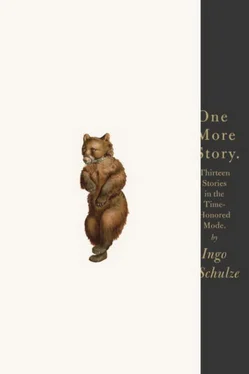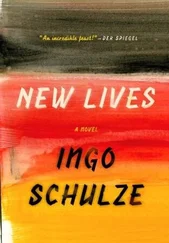I will nevertheless attempt to speak of myself and of how life shows a tendency to imitate literature.
On that Sunday, April 25, 2004—the last day, that is, of the Budapest Book Fair, where Germany had been the featured guest country — I had been struck by the possibly fruitful idea (depending on my mood I’m inclined to read frightful for fruitful, and vice versa) of making the trip to Vienna to present Petra with the manuscript of my story “Incident in Petersburg,” in which the first-person narrator is mugged. That had in fact happened to me. I am convinced that the mugging could have occurred only because I had not been paying attention, because my mind had still been wandering in Vienna with Petra. I had flown from Vienna to St. Petersburg on the same day we had separated. In my story the “incident” became a kind of framework for my memories of Petra.
Of course I could have sent the story to her without commentary and waited to see what happened. But I thought it would be better — since Vienna was suddenly so close — to tell Petra face to face that for once, apart from a change of names (Petra or Katja), I had invented nothing.
I called her from Budapest — the same number, the same ring tone as back then — and left a message on her answering machine. When I returned to the hotel, I found a note with a check mark on the line “Please return call,” above which stood the familiar number — which once again was answered only by a machine. I gave the date, time, and place of arrival, 12:20 p.m., West Station, and my time of departure, 3:45 p.m. I asked if it would be all right with her for us to meet at one o’clock, “just for an hour or so,” and promised to pay for her lunch. I proposed we meet at the Museum Quarter, and concluded by saying my cell phone number was still the same. If Petra didn’t appear, I planned to visit the Museum Quarter, which had first opened shortly after our separation.
Just buying my round-trip ticket on Friday made me feel like I was giving myself a present, treating myself to a luxury — even though it was a second-class ticket for which I had to fork over a mere thirty-four euros. It was strange to plan a trip on my own, to travel at no one’s invitation, and pay for the ticket out of my own pocket.
Sunday-morning rain summarizes the view that Budapest offers me at the level of a car window. The images blur together, turning gray as the asphalt, which looks bubbly somehow. The radio startles me, sniveling, “and all the bells were tolling,” the driver turns around and nods to me. “Am Tag, als Conny Cramer starb, und alle Glocken klangen, am Tag, als Conny Cramer starb, und alle Freunde weinten um ihn, das war ein schwerer Tag.…” I get it now — a German song, especially for me.
The car belongs to the hotel, the meter hasn’t been turned on. As we pull up at Keleti pu., the sense I’m being well taken care of leaves me downright euphoric. I would never call the Keleti pu. East Station. The Keleti pu. — the last time I stood there was in the summer of 1989. Vacation trips to Budapest began and ended at the Keleti pu., marked the start and finish of hitchhiking tours to Bulgaria — a train station almost as familiar to me as the Neustädter in Dresden.
The driver and I say good-bye with a handshake. I have plenty of time and no baggage except a shoulder bag with a half-liter bottle of water, a book by István Örkény, my notebook, which I always carry with me and never use, the blue folder with the manuscript of “Incident in Petersburg,” my wallet, and my passport. “I’m going to Vienna,” I whisper as I climb the stairs to the main entrance and, once at the top, turn around as if I’m about to say good-bye for good. “I’m going to Vienna.” A blue Michelin Man waves to me from a rooftop, blue is also the color of the Trabant in a row of parked cars, more than half of them made in Germany. And all the while I’m looking around — my hand pressed to my shoulder bag — there’s not a beggar in sight, no one wants anything from me, not even a wino stumbles by. As far back as May 1979, the first time I left from here, loaded down with books from the GDR Cultural Center and S. Fischer pocketbooks from a shop on Váci-utca, I dreamed that I was a writer on his way to Vienna. For twenty-five years that had meant something very different. Or I could also say that twenty-five years ago it still had a very real meaning.
Vienna is not even listed on the posted schedule. But instead Dortmund — which never had a chance in its 3–0 loss to Leverkusen yesterday, and today Bremen has to beat Bochum in an away game, otherwise that blows any chance of the UEFA Cup too. I don’t want to think about that and so buy a newspaper. You know what a train trip will be like within the first fifteen minutes, usually within a minute or two.
The train to Dortmund via Vienna is ready for boarding. I don’t have a seat reservation. I’m choosy and inspect the cars both outside and in. When I finally find one without compartments, most seats are occupied. The unoccupied ones are either on the aisle, or the upholstery glistens with a fresh grease spot, or they’re right next to the smoking section. There’s always some reason why a seat is unoccupied or still available. I return to one where the heater has an especially loud rumble. The train fills up. I’m not someone people like to sit down next to. That’s not a recent insight, but it still hurts even if I do breathe a sigh of relief whenever, after hesitating briefly, someone moves on.
I’m amazed at how soundlessly we pull out. But it isn’t us at all, it’s the Budapest — Moscow train. Or is it just switching tracks? I don’t see anyone at the windows.
I unpack the blue folder with my “Incident in Petersburg” story, slip my cell phone into my breast pocket along with my ballpoint, and pick up my copy of One-Minute Stories , which had lain on my lap on the plane and on my nightstand in the hotel. I tug at the dark red ribbon marker, open to page 18, and as our train lurches punctually at 9:35, begin to read the story entitled “The Bow.”
Even though as a train pulls out I usually panic at the thought that I’ve left my bag on the platform, I love riding trains. Just as you walk twice as fast on moving sidewalks at airports, I have the feeling I’m accomplishing more on a train than at home. In addition to all the reading and writing you get done, by successfully managing a change of place you easily triple the value of your daily output. And so I start to read, but am interrupted at once by bites of conscience, since I need to look through “Incident in Petersburg” and collect my thoughts about what I’m going to say to Petra three hours from now.
Beside me, on the other side of the aisle, is a French family. The parents smile, we exchange nods, the children are urged to say bonjour , which, however, neither the boy (curly hair) nor the girl (straight hair) does.
Green landscape outside and gardeners’ yellow containers, walls of seven narrow concrete slabs. Home supplies — Praktiker, OBI, hp — Nissan (by next Sunday, Hungary will be in the EU), the Danube, low shores, new huge buildings, with observatories on the roofs, circus-tent roofs — of course they only look that way. Then blocks of apartments — best guess, Khrushchev era — green again, small houses. The sympathy people extend to young families. They scatter stuffed animals, comics, and a book by James Ellroy on each of their four seats and set off in the direction of the dining car just as we stop in Kelenföld. Then Shell, Honda, Plus, Kaiser’s billboards lining the road. The buildings on the far side merging into the green. Perfect travel weather, IKEA, Stella Artois, Baumax.
I slip the ribbon marker back in, close One-Minute Stories , open the blue folder. I don’t know what to tell Petra. I’ve been under way for sixteen minutes now. “Sixteen”: Who was it that said “sixteen” so urgently? Suddenly I have the word “sixteen” in my ears but as if spoken by a foreigner, “sixteen” and “all the bells are tolling.”
Читать дальше












